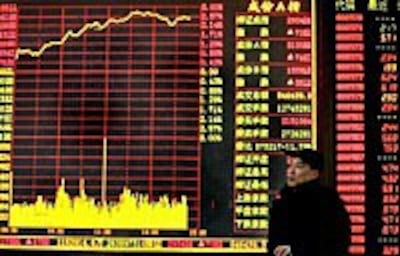
China’s banks and provincial officials have paid little heed to Beijing’s directives to cool down the economy, judging by results from the first half of the year, experts say.
Though Premier Wen Jiabao warned in March against over-investment and predicted moderate economic growth this year of 8 percent, China's economy grew at a near-record rate of 11.3 percent in the year's second quarter, according to The New York Times.
In interviews with Radio Free Asia, experts were asked whether banks and officials are simply defying the central government, or whether the command part of China’s mixed command-style and market economy simply doesn’t work any more.
Listening ‘with one ear’
Gary Hufabauer, a senior fellow at the Washington-based Institute for International Economics, said that China’s “command economy of yesteryear—let’s say 10 years, 15 years ago—is rapidly fading from the Chinese scene.”
“And the bank managers and directors probably don’t see themselves as defying the government,” he added. “They’re listening with one ear. But they’re also paying attention to their own salaries and any side-payments they may receive by expanding their loan books.”
They’re listening with one ear. But they’re also paying attention to their own salaries and any side-payments they may receive by expanding their loan books,
Hufabuer said that while China’s government has the power to slow economic growth, it is unclear whether it has really decided to do so. For now, he said, it only issues warnings and takes half-measures, with little effect.
The government could take control, Hufabauer said, if it would use “the hard-edged forces”—higher interest rates, higher reserve requirements, and an increase in the exchange rate—that are used by market economies.
“Clearly, the leadership does not want to take any of those hard measures and prefers to think that it can do it by administrative control, which clearly it cannot,” he said.
Hufbauer said that the downside to China’s rapid growth is “the potential of a really big crash, because so much of [China’s] loan book is involved in speculative investment and ventures of various kinds.”
Low exchange rate, land control drive growth
Gregory Chow, a senior economist and professor of political economy at Princeton University, said that government monetary policy has contributed to China’s problems with loan growth.
Supported by the low value of the yuan, China's foreign currency reserves grew to $925 billion by the end of May, according to the country's Financial News. Chow said that huge inflows of hard currency have found their way into the banking system, putting pressure on the banks to put the money out in loans.
“If the banks have all the money, how can you ask the banks not to loan it out?” Chow asked.
Chow added that government control over land is also driving economic growth.
“All government officials who have control of the land on their territory have a desire to use the land for investment to promote the growth of the economy. So, they encourage investment.”
Asked how long China’s economy might continue to grow at double-digit rates, Chow said “I don’t think that China can sustain over 10 percent.”
“But substantial growth, say over 8 percent or so—that could last for a number of years.”
Original reporting by Michael Lelyveld. Edited for the Web by Richard Finney.
